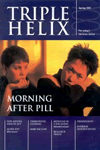Vaccination programmes pose a dilemma; individuals face remote but sometimes catastrophic risks to ensure that the community presents no risk to them of the disease. If individuals fail to take that risk however, both they and the community will suffer. We cannot isolate ourselves from the community of which we are part. As similar pertussis 'scares' in the 1970's showed, everyone suffers if we try.
In MMR vaccination a very effective multiple vaccine protects against measles, mumps and rubella. The risks of non-vaccination are incomparably greater than those of vaccination as large long term studies in other countries and increasing experience in the UK fully confirm. High take up levels are necessary to achieve the benefits of the programme. One largely discredited article has claimed that the triple vaccine is associated with a greater risk of autism and possibly Crohn's disease. The media raise doubts; vaccination rates fall; and the risk of a measles epidemic is real. Parents are frightened and seek single injections instead.
The injection of foreign protein can never be a risk free procedure. In infrequent cases, local and/or systemic complications of varying severity occur. Single injections multiply that admittedly low risk. We may concede much to modern autonomy but doctors are not morally or legally required to act against their better judgement when choosing vaccines however 'paternalistic' their actions are judged by others to be. Doctors must use their own rigorous standards in reaching this 'better judgement' and not simply adopt the opinions of others. Wakefield and Montgomery (Adverse Drug React Toxicol Review 2000; 19:265-283) imply that the 'Establishment' has failed to undertake all necessary research and ignored some that has been done. We need to satisfy ourselves that this is not true and to warn parents of the real dangers and choices. The public is well aware that 'Establishment' views have been wrong in the past and is unlikely to be convinced by slick advertising campaigns. Whilst the media like to present contrasting views as equally valid, doctors must be clear that, in this case, one view is overwhelming and the other tenuous.
Doctors who have read professional reviews and who are prepared to expose their own close relatives to vaccination can be reasonably satisfied that their own 'better judgement' is indeed ethical. We need to be honest about vaccination risks confirmed by reliable evidence and to change our practice if new findings justify it. We must ensure that all those who actually give the vaccine know and observe any contraindications however rare. Audit procedures will need to be in place. If parents reject our advice that is their legal right but our moral responsibility remains to ensure that such a decision is as 'informed' as possible.
































